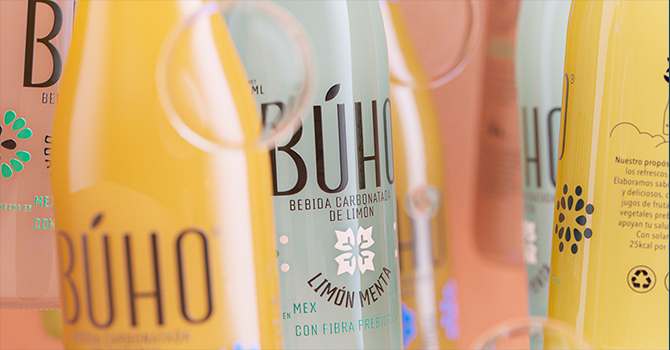Even in the soft drink capital of the world, soda drinkers are looking for better-for-you versions of their favorite drink. At least, that’s the bet being made by Mexican soda brand Búho.
At 163 liters annually, according to government statistics, Mexico is the global leader in per-capita soda consumption. Despite the well-publicized links between sugar consumption and health issues such as obesity and diabetes, soft drinks remain a staple of Mexican culture and commerce, accounting for around a quarter of sales for small merchants in the country. Upon launching Búho in 2016, the brand’s CEO and founder, Roman Gaa, explained that the company’s original ambition was simply to operate as a regional brand making clean label, high quality versions of the sodas that Mexican drinkers already love. That strategy has taken the brand beyond its home, though, with distribution now in 17 countries including the U.S., Australia, Europe and the Middle East.
Yet that growth was threatened in February, after the Mexican government approved a law requiring new oversized warning labels on certain products with “excessive” amounts of saturated fat, trans fat, sugar, sodium or calories. A month later, with the world in full grip of the COVID-19 pandemic, the commercial outlook turned even bleaker. Weighing its options, Búho ultimately decided that the situation justified a pivot in tactics.
“We said ‘this is going to be a difficult year for us,’” said Gaa, noting that this marked the third time since launch that Mexico has changed the law on labels. “So let’s focus more on our product and what the new legislation means for our product and take it as it is — it’s a bad year for sales.”
The result is complete reformulation across Búho’s eight flavors which takes it both out of reach for the new label requirements in Mexico — coming in at 8 calories per 100ml versus 18 previously, and now at 4 grams of sugar — and into the realm of functionality with the addition of plant-based prebiotic fibers. Each drink has around 24-28 calories and 7.8 and 9.6 grams of fiber per 12 oz. glass bottle, and is sweetened with stevia (Reb M) and alulosse.
Búho’s revamped sodas are also aimed at helping the brand expand its U.S. presence, currently comprising about 100 mostly on-premise accounts (along with Latin grocery chain Super King) in Southern California opened prior to the pandemic. As the virus spread and impacted businesses and communities, further expansion was temporarily suspended; “We didn’t want to open new accounts and then have to change flavors in a couple months when people were used to the original ones,” Gaa said. Shipping is expected to resume in Spring 2021.
Though California’s COVID infection rate continues to climb through the winter, Gaa said Búho has plans in place to accelerate growth in the U.S., which he described as its most “interesting and important” market. Where Mexican import brands like Jarritos have found a home in taquerias and Latin groceries, Gaa said Búho is positioning itself as a better-for-you product to benefit long-term from an increase in upscale Mexican restaurants serving sophisticated ethnic cuisine. Though the brand’s retail footprint is still small, the opening of a warehouse facility in San Antonio, Texas, originally scheduled for February, will give it a central distribution hub for the States. Manufacturing will stay in Mexico, Gaa said, but the company is exploring opening a second manufacturing facility in northern Mexico close to the U.S. border in order to boost efficiencies on either side of the divide.
In the U.S. market, prebiotic and probiotic-infused soda has quickly emerged as a soft drink disruptor, as brands like Olipop, Culture Pop, Health-Ade and others seek to bridge the gap between demand for innovation in sparkling beverages and gut-health boosting products. Yet, with its branding and embrace of regional ingredients and flavors like jamaica (hibiscus) and tamarind, Búho has a distinctly Mexican identity. On the other hand, the concept of fiber-infused soda is less well-known in Mexico, where full-sugar CSDs are still dominant, and may be confusing to consumers expecting a different type of experience.
For Gaa, attempting to walk the line between the two categories in both presentation and price — at $1.99, a bottle of Búho is roughly double the price of Jarritos, but less than some of the other aforementioned probiotic “pops,” he said — may have been a choice influenced by external factors, but one that is still true to the brand’s ethos.
“The other Mexican sodas, which are very traditional, the most benefit that they have is that they taste good,” he said. “But the formulas are from the 1950s and 60s, and that’s far from what lots of consumers these days are looking for.”

